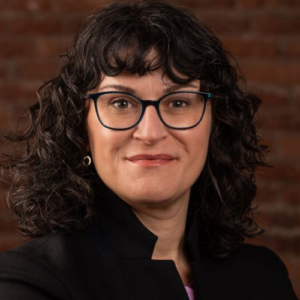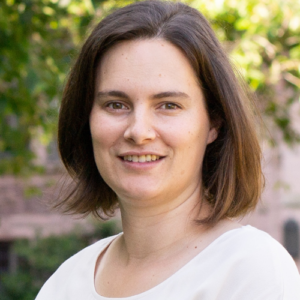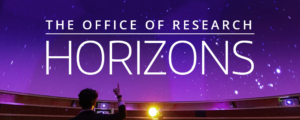Horizons Newsletter – April 2025
Published April 22, 2025
A Message from the Vice Provost
The past several weeks have been challenging for the UW research community due to federal agency actions associated with policy changes in the current administration. It is important to understand the evolving landscape, but before digging into that difficult topic, I want to start on a positive note – with a reminder of the importance of research at UW and a recognition of the great work that our researchers do. UW researchers are advancing healthcare, making scientific breakthroughs, advising policymakers, and working with communities to improve K-12 education. In FY23, UW research generated $2.6 billion for Washington’s state economy. This year we again saw many researchers recognized with prestigious awards (highlighted below) and high national and international rankings. Research is core to UW’s mission and our identity as an R1 institution. UW consistently ranks among the top research universities globally, and the breadth of our research impacts is a source of pride.
Knowing the impact of UW research, it is discouraging to see all the award terminations, restrictions on funding, threats to indirect cost recovery, revoked student visas, and more. The implications for the researchers involved and the people who benefit from their work are heartbreaking. Over the past several weeks, the Office of Research has been working to quickly respond to each challenge as it comes, working in partnership with other central units, the Attorney General’s Office (AGO), and leaders in the affected schools and colleges, as well as networking with our many peers who are facing similar challenges. We recognize how challenging this time is across our entire research community, and we want you to know that many colleagues across central offices, schools and colleges, and support units are fully engaged in responding to these issues alongside you. That work includes supporting the AGO in legal challenges, working with them on appeals, and seeking their guidance on interpreting new requirements.
Early on, the federal administration’s actions came from a few agencies and targeted a few specific topics, but every week expands the scope. It is likely that all our schools and colleges will be touched. At the same time, rising costs of salaries and benefits, as well as the impacts of tariffs, mean that current research budgets are stretched thin. The possibility of a drastic reduction in indirect cost recovery – which is essential for maintaining research infrastructure, compliance, and administrative support – poses serious challenges to the sustainability of UW’s research enterprise. We remain committed to enabling research opportunities, but we must also ensure that we have the resources necessary to support them responsibly. Moreover, the impacts are not just financial – concerns range from loss of public data to visa cancellations and policies that threaten academic freedom. It is clear that the future research landscape is going to change, and reacting to the daily challenges is not enough. We need to proactively work to preserve and strengthen research resilience and capacity, so that we not only weather the current challenges but are also well positioned for future opportunities.
To that end, I’ve been talking to UW leaders and soliciting ideas for an initiative that I’m calling Research Resilience @ UW. The key objectives are: i) preserve research capabilities and expertise, ii) support people (faculty, staff and students) in navigating changes in the federal landscape, and iii) change the narrative on research impacts. We’ve started identifying specific strategies for each objective, with overarching strategies of fundraising and leveraging external partnerships. We are seeking broader input and will be hosting discussions in the future. In the meantime, please email suggestions to orcomm@uw.edu with the subject line “Research Resilience.”
To preserve research capabilities, I believe that sharing resources is critical. As a first step, we are building a new web resource for shared/core facilities, to enable researchers (including external users) to easily find equipment and services and also expand revenue streams. Surveys will be sent to facility directors already in our database. If there’s a facility you think should be included, email orcomm@uw.edu with the subject line “Shared Facilities” and provide contact information for the facility director.
In support of the other objectives, we are hosting a series of workshops and panel discussions, and we are fortunate to have two Provost Academy Fellows working with the Office of Research with interests in supporting these initiatives. Details about the series and Fellows are provided below.
The challenges of responding to a combination of agency work orders to stop, change, resume and/or terminate awards come at a time when Workday is still being configured to more fully support effective processes in the grants space. The added work makes it more difficult to address the Workday challenges but all the more critical to do so. The Office of Research, UW IT, and the Office of Finance, Planning and Budgeting (FPB) are partnering in a new initiative, Awards Improvement and Development Effort (AIDE), aimed at reducing backlogs, improving reporting and streamlining administrative processes from award setup to closeout. A brief overview of AIDE with links to more information is included in this newsletter.
These are initial steps, and plans will evolve with community input. I encourage you to contribute to the Research Resilience effort, whether by sending your ideas, participating in workshops and taskforces, or supporting your colleagues who may be more directly impacted by these challenges.
Thank you for all your contributions to research and to our research community.
Mari Ostendorf
Vice Provost for Research
Recent UW Award Winners
The exceptional faculty and research community at UW are central to the reputation of this institution as a global leader in innovation and one of the top-ranked universities in the world. Year after year, numerous UW faculty are the recipients of the most prestigious honors in their fields, a testament to their excellence and dedication. The Office of Research congratulates all award winners this academic year and highlights a few awardees below.
American Academy of Arts & Sciences
Dan Suciu, Allen School of Computer Science & Engineering
Beckman Young Investigator Award
Ayokunle Olanrewaju, Bioengineering
National Academy of Inventors
Corie Cobb, Mechanical Engineering
National Academy of Sciences
Qiang Fu, Atmospheric Sciences
Raymond Huey, Biology
National Academy of Sciences Public Welfare Medal
Mary Claire King, Medical Genetics & Genome Sciences
NAS Award for Scientific Discovery
Xiaodong Xu, Physics & Materials Science
Nobel Prize for Chemistry
David Baker, Biochemistry
Pew Biomedical Scholars Award
Devon Schweppe, Genome Sciences
Claudia Vasquez, Biochemistry
Presidential Early Career Awards for Scientists & Engineers (PECASE)
Donald Chi, Dentistry
Bhuvana Srinivasan, Aeronautics & Astronautics
Kate Starbird, Human Centered Design & Engineering
Bobby Wilson, Mathematics
Erin Wirth, Geophysics
Schmidt Polymath
Ashleigh Theberg, Chemistry
Searle Scholar
Nick Riley, Chemistry
Sloan Research Fellowships
3 UW faculty awarded in 2025
Washington State Academy of Sciences
15 UW faculty elected in 2024
RESEARCH RESILIENCE @UW
Together with our partners (UW IT, Office of Academic Personnel & Faculty), the Office of Research is hosting a series of workshops, discussions, and information sessions designed to provide support, introduce new resources, and share ideas with colleagues in the UW research community. These events will give researchers an opportunity to ideate, discuss, learn, and network with other researchers to build community and inform their individual work.
Researcher Experiences and Needs in Cases of Targeted Harassment and Intimidation – Listening Session
- Friday, April 25, 2025, 9:00 – 10:30 am
- Location: Parrington Hall, Room 320
- Register
Researchers are increasingly faced with attacks on their character, credibility, and work. This concerning trend is complex and requires action on multiple fronts, but its overall impact is felt by individuals, groups, institutions, and society alike. To better understand and support the scope of concerns for UW researchers in this situation, the Offices of Research and Academic Personnel & Faculty are hosting a listening session to provide an opportunity for researchers to share experiences, support needs, and ideas for response in cases of targeted harassment and intimidation. Seating is limited and nearing capacity. To participate in this session or future sessions, please respond to the survey at the registration link. Please email Emma Spiro (espiro@uw.edu) if you have questions about this event.
Discover KOPAH – Your New S-3 Compatible Campus Storage Solution at Data Storage Day
- Monday, May 5, 2025, 1:00 – 5:00 pm
- Location: eScience Institute
- Register
Join us at the eScience Institute for the official Kopah S3 Storage Service Launch Event —your gateway to fast, scalable, and secure storage right on campus. Whether you’re a researcher handling big data, an instructor managing course materials, or simply someone in need of reliable cloud-like storage, Kopah is designed for everyone. This event will feature live demos of S3-compatible tools like s3cmd, Globus, JuiceFS, Cyberduck, and boto3, and staff will be available to help you get started with Kopah S3.
Understanding and Communicating the Societal Impact of Research Workshop
- May 9, 2025, 9:00-11:30am – Location: HUB 145
- May 23, 2025, 9:00-11:30 am – Location: TBD
- Register
These peer workshops – facilitated by Professors Heather Hill and Sara Curran – welcome interested UW researchers to discuss how we can better understand, measure, and communicate the societal impact of research. The workshops are open to interested researchers from any of the three campuses, any department or school, and any position responsible for leading research. Please register for either workshop by April 25, 2025.
Getting Started with GPU Computing
- Thursday, May 15, 2025, 10:00 am– 4:30 pm
- Location: UW Tower, South Cafeteria Mezzanine Level
- Register
As part of their national GPU in EDU Seminar Series, Cambridge Computer and NVIDIA will host a hybrid event at the University of Washington on Thursday, May 15th. The program will feature presentations and hands-on demonstrations led by Cambridge, NVIDIA, and members of the UW-IT Research Computing team, focusing on the expanding role of AI and data science in academic research and education. Engage with leading voices from the community as they explore current use cases, emerging technologies, and practical strategies for accelerating research workflows with GPUs. All registrants will receive the Zoom meeting information via email and calendar invites.
Disappearing Data Panel and Discussions: Recoveries, Repositories, and Resiliences
- Monday, May 19, 2025, 9:30-11:00am
- Location: Parrington Hall, Room 360
- Register
This panel presentation will provide an overview of the challenges surrounding the loss of data, including data that is removed from publicly available sites, national surveys that are canceled, and standard survey measures or data changed for non-scientific reasons. The panelists will discuss the current status of these challenges, approaches for recovering and restoring data, and possible strategies for resilience. There will be time for audience members to engage in a discussion with the panelists to brainstorm ways to meet these challenges and minimize the effects on scholarship and scholars. Please register by May 9, 2025.
PROVOST’S ACADEMY FELLOWS
The Office of the Provost recently launched the Provost’s Academy, a new initiative designed to cultivate and elevate the perspectives of the next generation of UW academic leaders. The six faculty members in the inaugural cohort were chosen from three dozen applicants and represent the major functional areas of the Office of the Provost. Two faculty members in this cohort, Heather Hill and Emma Spiro, are both hosting events in our Research Resilience @UW series and working on initiatives led or co-led by the Office of Research.
 Heather Hill, Professor, Evans School
Heather Hill, Professor, Evans School
Heather Hill conducts research on poverty, social policy, and the wellbeing of families and children. In recent studies, she has examined access to the Washington Paid Family and Medical Leave program and the effects of state Earned Income Tax Credits on child maltreatment and other forms of violence. In addition to communicating results to scholarly audiences, she has testified to state legislative committees, written policy briefs and reports, and worked with organizations like The Conversation and AAAS SciLine to make research accessible to the media and the public. Dr. Hill’s work with the Provost Academy is focused on building our individual and institutional muscles for understanding and communicating the societal impact of research. The May 9th and 23rd workshops, hosted as part of the Research Resilience @UW series, are an opportunity for UW researchers to learn from each other about both the opportunities and challenges to understanding and communicating the societal impact of research.
 Emma Spiro, Associate Professor in the iSchool and a co-founder and Faculty Director of the UW Center for an Informed Public
Emma Spiro, Associate Professor in the iSchool and a co-founder and Faculty Director of the UW Center for an Informed Public
Emma Spiro has worked for more than a decade to advance our understanding of how and why false rumors move through populations during crisis events, particularly in online platforms. These challenges are more than just bad facts, because they often result from social groups trying to make sense of the world – as social process that can go awry or be manipulated. She and her colleagues have studied cases across public health, elections, and natural hazards. Their work that has received considerable attention and become the subject of targeted attacks. Building on her center’s experiences and collaborations with units across campus, Dr. Spiro’s work with the Provost Academy seeks to develop institutional policies and resources to respond to incidents of researcher intimidation and harassment. Our April 25th listening session, hosted as part of the Research Resilience @UW series, and in collaboration with the OAPF, will be a first step in this project, aiming to surface the current experiences of UW researchers and their needs for institutional support.
THE AIDE INITIATIVE
Starting in mid-February 2025, UW Finance, Planning & Budgeting, UW Office of Research, and UW Information Technology began a collaboration with campus leaders to improve awards management in grants administration. The Awards Improvement and Development Effort (AIDE) project initiated work on two preliminary improvement projects in early April: 1) Implement the integration between SAGE and Workday for Award Modification requests to improve efficiency and reduce redundant data entry; and 2) Expedite implementation of the Award Activity view in SAGE, to provide Campus, OSP, and GCA with improved transparency of status and outstanding items related to a specific award, along with a visualization dashboard of the Award process to improve visibility around the backlogs. AIDE’s Assessment Phase completed in mid-April, resulting in recommendations for 13 goals to address by the end of July. The next step is to design the work plan for these goals by end of April. For more information, please visit the AIDE web page.
